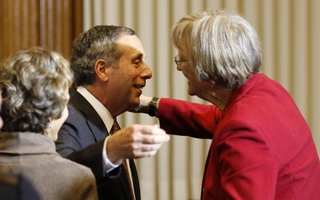{shortcode-af15b91ec859ab61f1129ddac13dd7f5c0510751}
UPDATED: February 19, 2018 at 9:47 p.m.
At 66, incoming University President Lawrence S. Bacow will be the oldest president ever to take charge of Harvard when he moves into Massachusetts Hall this summer—experts, though, say his age is unlikely to determine the length of his tenure.
Bacow will be the first president since Charles Chauncy—Harvard’s second president—to begin his tenure at an age above 60. Bacow’s predecessor, current President Drew G. Faust, was inaugurated at age 59.
Judith A. Wilde, a professor at George Mason University’s School of Policy and Government, cited a study from the American Council on Education that found five percent of university presidents were over the age of 70 in 2011, but 11 percent were over the same age in 2016. A survey of over 1,500 American colleges and universities revealed that 58 percent of college presidents are above the age of 60, according to the Council.
Wilde said age is unlikely to be a strong factor in determining the length of a presidential posting.
“This is just a personal opinion, but I think more and more are seeing themselves as vibrant and active,” Wilde said. “If I feel like I still can be of benefit to a university, why should I stop just because I hit a specific age?”
In addition to setting a historical record at Harvard, Bacow will soon be the third-oldest president among the presidents currently leading all eight Ivy League schools. He will trail only University of Pennsylvania President Amy Gutmann and Columbia University President Lee Bollinger, who are 68 and 71, respectively.
If Bacow serves a 12-year term—the average tenure length of Harvard’s 28 presidents—he will be 78 years old at the end of his time in office. The last president to serve into his seventies was Abbott Lawrence Lowell, who served from 1909 to 1933, at which point he stepped down, aged 76.
Raymond D. Cotton, an attorney specializing in higher education leadership, said he was “very pleased” by Bacow’s selection.
“Larry is exceptional. It’s not just because of his interactions with me, but with everybody,” said Cotton, who noted that Bacow often went running with undergraduates during his Tufts tenure. “I would not judge him strictly by his age.”
Cotton said the typical tenure of a university president would include a three-year contract followed by a five-year contract. For a president with prior experience—like Bacow— a tenure can last up to ten years, according to Cotton.
When Bacow stepped down from the Tufts presidency in 2011, he said a decade formed the ideal time period for a presidential tenure. The longest-serving Harvard president to date is Charles W. Eliot, who served 40 years, from 1869 to 1909.
“I have often said that 10 years is about the right term for a university president,” Bacow said at the time. “It is long enough for one individual to have a substantial impact but not so long that the institution, or the president, becomes comfortable.”
Cotton said he hopes that Bacow will indeed pursue a ten-year tenure.
“I hope he stays at least ten years,” Cotton said. “With an institution like Harvard, it takes time to change the culture because you have to bring everyone on board.”
This article has been revised to reflect the following correction:
CORRECTION: February 19, 2018
A previous version of this article incorrectly asserted University President-elect Lawrence S. Bacow will be the second-oldest president among presidents of Ivy League Schools when he takes office. In fact, he will be the third-oldest; both University of Pennsylvania President Amy Gutmann and Columbia University President Lee Bollinger are older.
—Staff writer William L. Wang can be reached at william.wang@thecrimson.com. Follow him on Twitter @wlwang20.Read more in News
The Half-Century Fight for a Multicultural CenterRecommended Articles
-
 Bacow Disappoints Diversity Advocates’ Pres. Hopes
Bacow Disappoints Diversity Advocates’ Pres. Hopes -
66-Year-Old Married White Male With a DoctorateAt a time when the average university president in the United States is a 62-year-old married white male with a doctorate, Harvard could have stood out as an exception.
-
 Under Bacow, Likely Administrative Turnover
Under Bacow, Likely Administrative Turnover -
The Practicality of a ‘Pracademic’During these crucial moments in Harvard’s history, we require a practical administrator more than an accomplished academic.
-
 Bacow Inauguration Set for October
Bacow Inauguration Set for October













